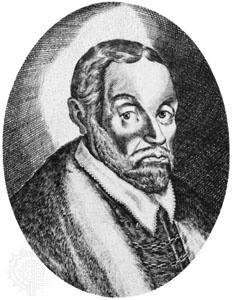Guarini, Battista
Italian poet
born Dec. 10, 1538, Ferrara
died Oct. 7, 1612, Venice
 Renaissance court poet who, with Torquato Tasso (Tasso, Torquato), is credited with establishing the form of a new literary genre, the pastoral (pastoral literature) drama.
Renaissance court poet who, with Torquato Tasso (Tasso, Torquato), is credited with establishing the form of a new literary genre, the pastoral (pastoral literature) drama.Guarini, having studied, perhaps at Padua, before he was 20 became professor of rhetoric in Ferrara. In 1567 he entered the service of Alfonso II, duke of Ferrara as courtier and diplomat. He became the friend of Tasso, who was also in the Duke's service, and, in 1579, replaced Tasso as court poet when he was imprisoned by the Duke for erratic behaviour caused by mental disturbance. Guarini found the position uncongenial and retired in 1582 to his ancestral farm, the Villa Guarini, where he wrote his celebrated dramatic pastoral, Il pastor fido (“The Faithful Shepherd”). Written and revised over a period of many years, this pastoral tragicomedy, set in Arcadia, was published in 1590 and first performed at the carnival at Crema in 1595. Although it lacked the lyrical simplicity of Tasso's earlier work in this genre, Aminta (1573), it had a more immediate success, becoming one of the most famous and most widely translated and imitated works of the age. For nearly two centuries Il pastor fido was regarded as a code of gallantry and a guide to manners. An English adaptation is John Fletcher's The Faithfull Shepheardesse (1609?). Sir Richard Fanshawe's translation (1647) was critically edited in 1964 and 1976.
Guarini reentered public service in Ferrara in 1585, but his reconciliation with the court was short-lived. After service in Rome and Florence, he returned again to Ferrara, passing his last years in study, lawsuits, and polemical disputes with his critics. In Compendio della poesia tragicomica (1602), he ably defended Il pastor fido against the criticism that it departed from Aristotelian rules of dramatic structure.
- Gail Godwin
- Gailhard, John
- Gaillard, Château
- Gaillardia
- Gaiman, Neil
- Gaines, Ernest J.
- Gaines's Mill, Battle of
- Gainesville
- Gaines, William Maxwell
- Gainsborough
- Gainsborough chair
- Gainsborough, Thomas
- Gainza Paz, Alberto
- Gairdner, Lake
- gai saber
- Gaiseric
- Gaitskell, Hugh
- Gaitán, Jorge Eliécer
- Gaius
- Gaius Asinius Pollio
- Gaius Avidius Cassius
- Gaius Caesar
- Gaius Cassius
- Gaius Cassius Longinus
- Gaius Cornelius Gallus